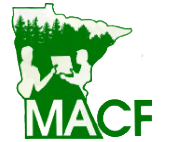Bylaws of the
Minnesota Association of Consulting Foresters
(December 30, 2006; amended April 21 and June 17, 2011)
Objectives of the Minnesota Association of Consulting Foresters (MACF):
1. To promote sustainable multiple use management of the forest resources of Minnesota.
2. To promote management programs that enhance the long-term productivity of forest resources and minimize the impact of development.
3. To support programs that beneficially impact the environment for Minnesota Forests.
4. To acquire and disseminate information that is useful to persons operating as consulting foresters and practitioners and suppliers in Minnesota.
5. To further public recognition of MACF and MACF members.
6. To encourage the highest ethical standards in the delivery of forest management assistance.
Qualifications and Rights of Members:
1. Consultants
A. Shall be actively offering his or her forestry consultation services to the public through the private sector for a fee or retainer. The Consultant's base-of-operation or those served must be within Minnesota.
B. Must possess a four-year, or higher, degree in forestry (or a closely related field) from an accredited college or university and have five years of experience in the field of forestry.
2. Retired Consultant
A. Shall derive their principal income from retirement, disability, or activities other than consulting.
B. Must have held Consultant membership in the Association and maintain a current interest in the Objectives of the Association.
C. Retired Consultants will advise the Executive Committee of potential nominees for office.
3. A person shall become a voting member through payment of annual dues, with assessment of additional dues if deemed necessary.
4. The applicant for membership will send an application form to the President. At least twice a year, the President will send a copy of the application(s) for membership to the members for a vote. An affirmative vote by a simple majority of the voting members in good standing shall be required for acceptance. The applicant will be informed of the results of the vote in advance of the next scheduled meeting.
5. All member classes may vote; each member has one vote.
6. No member shall have an association with an economic interest in a timber purchasing or procurement entity wherein a potential conflict of interest may exist in serving landowners. The Consultant will work to achieve the highest values for the landowner that meets their objectives.
Officers and Duties of Office
1. Officers will serve two-year terms. Consecutive terms are allowed.
A. President
i. Serves as official spokesperson for the Association.
ii. Calls special meetings as needed.
iii. Coordinates the work of the Executive Committee and recruits members for other committees or duties, as needed.
B. Vice President
i. Acts as assistant to the President.
ii. Makes arrangements for the Association's annual meeting.
iii. Coordinates new member application procedures.
C. Secretary
i. Maintains records of member qualifications and addresses and sends out annual dues notices.
ii. Takes minutes of all official meetings, including the last meeting of the term.
iii. Arranges for, or provides, a mailing address for the Association.
iiii. Renews non-profit filings with Secretary of State and maintains incorporation records.
D. Treasurer
i. Maintains the Association's financial accounts, subject to member audit.
ii. Reports data, or arranges for reporting, as required by state and federal tax authorities and shares electronic passwords with the Secretary.
Executive Committee:
1. The Executive Committee shall be the officers of the Association and the Past President. For continuity, the Past President will remain a signatory to the bank account if no other signatories remain as officers.
2. The Executive Committee shall be responsible for the business of the Association and shall have control of all funds.
3. Vacancies in any position other than the President shall be filled by appointment by the Executive Committee. Such appointees shall hold office until the next regular election of officers.
Dues:
1. The Executive Committee shall set the dues. Dues for Retired Consultants will be approximately 60% of the annual dues of Consultant members.
2. Annual dues from members initially approved after October will be credited to the following year.
Authorized Payments:
1. The Executive Committee shall authorize the payment of all legitimate expenses.
2. Legitimate expenses may include payment of actual, reasonable expenses incurred by officers or other designated members for postage and for attending meetings and other functions that further the Association's objectives.
Meetings:
1. There shall be at least one annual business meeting of the Association.
2. Meetings of the Executive Committee shall be called by mutual consent of that Committee.
3. Meetings shall be conducted by Roberts Rules of Order.
4. A quorum for mail balloting shall be 50% of qualified members.
Ethics:
1. The Association, through vote of the membership, shall establish a voluntary Code of Ethics.
Amendments:
1. Amendments to the Articles or Bylaws may be proposed to the membership by the Executive Committee or by written petition of 20 percent of the membership.
2. Amendments to the Articles or Bylaws shall be approved upon a two-thirds affirmative vote, including two thirds of the voting Consultant members.
Merger or Dissolution:
1. Upon merger or dissolution of the Association, the Executive Committee shall, after paying or making provisions for the payment of all liabilities, dispose of the remaining assets exclusively for the purposes of the Association in a manner, or to such organizations as are operated for scientific, educational, or benevolent purposes as shall at the time qualify under Section 501(c)(3) of the Internal Revenue Code (or the corresponding provision of any future Minnesota or future United States Internal Revenue Law), as the Executive Committee shall determine.
